Transactional email can form an important part of yor business software. It is often used to send notifications, alerts and updates to users signifying/reporting on events in a system. Previously, many systems may have use their own infrastructure to send these messages. But in recent times, ensuring that these messages are delivered can often be a difficult task.
With such a high prevalence of SPAM online, ensuring that your emails are delivered to an inbox requires constant monitoring and management of your email server. For many businesses, this is simply not an option - often due to complexities of black lists and the time required to manage this. Thus, using an external provider for your transactional emails can be a great way to ensure that your email delivery is managed by a third party - allwoing you to focus on designing the emails/experience into your business processes.
Amazon SES is an email service provided under the Amazon AWS umbrella of services. Amazon Web Services (AWS) provides a suite of cloud-based computing services to allow businesses to leverage enterprise-level technology without the cost of purchasing hardward on their own.
Using Amazon's SES, we have been able to integrate fast and responsive email messaging into systems developed for clients. And we have also integrated 2-way messaging (outbound and inbound emails) on the platform. Our experience indicated that Amazon SES is a robust and scalable solution providing timeluy delivery of messages. However it is a "bare bones" system that, (unlike other products on the market), provides little in the way of reporting or metric through a browser. As such, it is important to work with a consultancy that has experience with Amazon SES to get the most out of the system.
In short, we found the system to have the following Pros and Cons:
PROS:
- The system is highly scalable;
- It is well suited and easily integrated with applications already on the AWS architecture;
- The system is very cost effective - the cheapest soution we have found; and
- Message delivery (at present) is performing consistently well.
CONS:
- It is not the most intuitive solution out there and can be difficult to implement;
- It is a bare bones system - you have to roll your own message receipts/delivery/bounce-backs, etc;
- It can often be very difficult to debug/decipher the response messages - we found the actual messages received were different than documented; and
- There is no GUI to review messages sent.
In light of the pro's and con's we would highly recommend Amazon SES as a Transactional email service for businesses that were looking for a customisable solution for transactional emails. There is a learning curve to the implementation, but the "bare bones" nature of the system means that you can incorporate the software in the way you want it to operate - providing a very high degree of flexibility. For customers looking to make use of a GUI to report on transactional email performance, Amazon SES may not be the tool for you. But if you are looking for a scalable and robust solution, with the flexibility to implement messaging your way; then Amazon SES comes highly recommended.
Before developing your next solution, it is important that you evaluate alternatives on both sides of the development spectrum and chose the option that best suits the requirements of the system.
If you are looking to develop a system/solution for your business, contact us to find out how we can be of assistance. As IT Consultants, DCODE can assist you in identifying your system requirements and then determining the best alternatives available. We can help you to evaluate Cloud Apps and/or Custom Software solutions and chose the one that suits you. And with our in-house development team, we can either implement a Cloud App or develop and launch your Custom Software solution. If you're interested in rationalising your operations with technology, Contact Us to find out how we can help.






